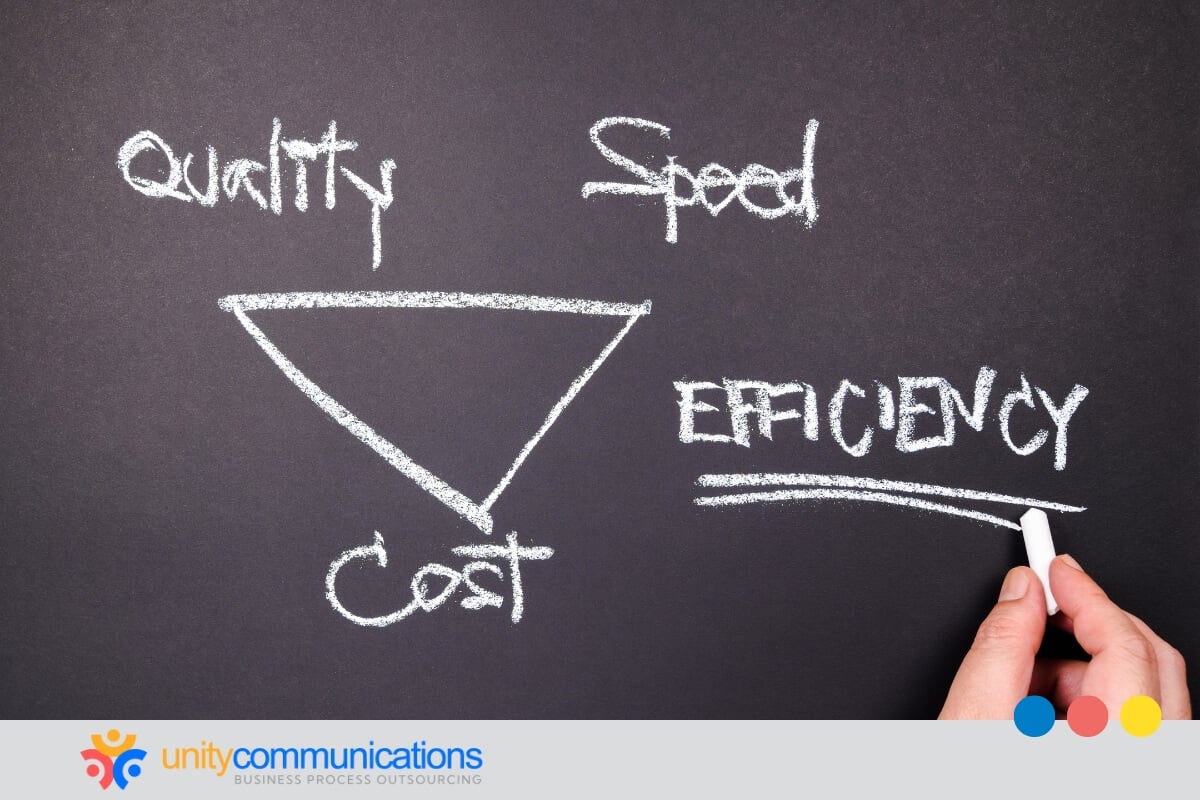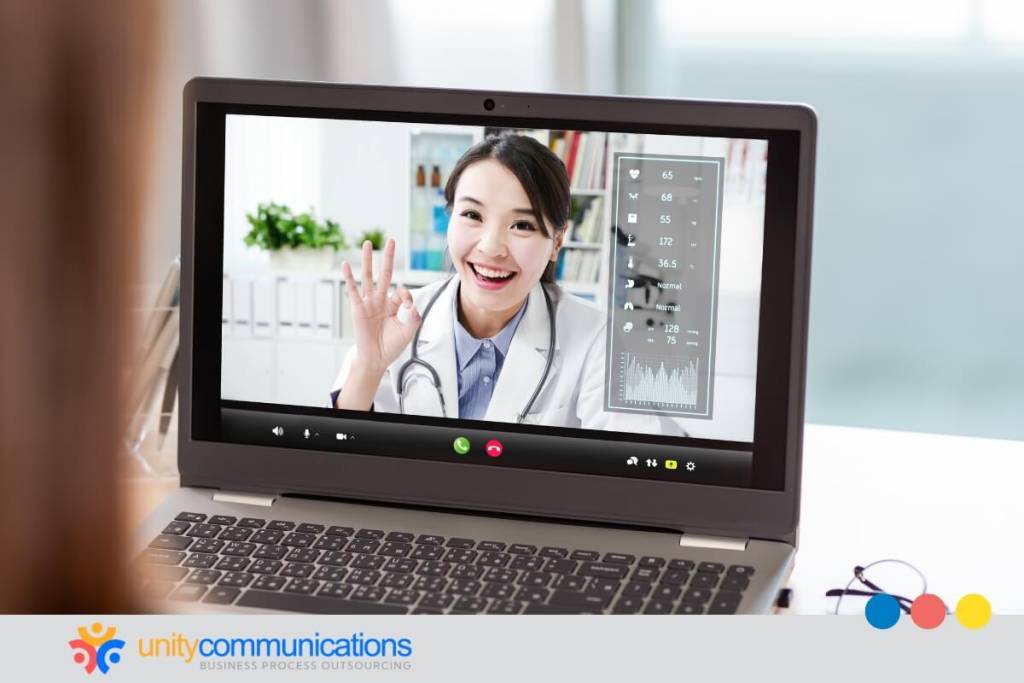IN THIS ARTICLE
Table of Contents
Specialized technologies automate processes, protect patient information, and enable real-time communication in healthcare practices. With advanced systems, platforms, and software, virtual medical assistants (VMAs) can enhance efficiency, performance, and service delivery.
This article lists useful software for patient management, communication, and more. It also explores the role of outsourcing in equipping virtual medical assistants with the right tools for success.
Keep reading to learn valuable insights for your healthcare organization!
Useful software for virtual medical assistants

Digital technologies in the healthcare industry empower remote professionals to improve productivity, accuracy, collaboration, and patient interaction.
Below are some useful software for virtual medical assistants:
Patient management systems
Patient management systems are critical for organizing and preserving patient information. They usually feature the following:
- Appointment scheduling enables VMAs to effectively schedule and manage patient appointments.
- Patient monitoring helps update individual information in real time, improving treatment continuity.
Patient management systems improve VMAs’ capacity to control patient flow and maintain accurate health data. These solutions lessen the administrative burden by streamlining appointment scheduling, allowing ample time and attention for patients. Accurate tracking leads to prompt follow-ups and individualized care.
Meanwhile, records management improves the accuracy and comprehensiveness of patient health records. A thorough record of patient interactions allows for more effective diagnosis and treatment, enhances the overall quality of care, and guarantees compliance with healthcare regulations.
Communication platforms
Secure messaging and video conferencing are useful software for patient communication. They allow virtual medical assistants to keep patient information private while doctors provide remote treatment. Features include:
- End-to-end encryption protects patient information during transmission.
- Compliance with privacy standards means patient information is managed per industry regulations, such as the Health Insurance Portability and Accountability Act of 1996 (HIPAA).
Secure messaging makes healthcare more accessible. VMAs can discreetly connect with patients, while video conferencing allows virtual consultations.
The interoperability of communication platforms and existing healthcare management systems is vital. Integration seamlessly merges patient communication data with health records, resulting in a complete health view. This link improves care efficiency, offering VMAs the necessary information to help doctors provide correct, timely treatment.
Task automation software
A task automation platform is another useful software and a game changer for virtual medical assistants. It is ideal for streamlining tasks such as the following:
- Data entry is the input of patient information.
- Billing oversees invoicing and payment processes.
- Insurance verification certifies the patient’s coverage and benefits.
Automating these activities saves VMAs time, allowing them to focus on more complex tasks rather than administrative obligations.
Automation tools also lessen human mistakes in repetitive operations. They contribute to the integrity of medical documentation via accurate data entry, billing, and insurance verification. Accuracy is critical in healthcare, where errors can significantly affect patient care and safety.
Data security solutions
Protecting sensitive patient data is indispensable in healthcare. Data security solutions include the following:
- Encryption software protects data against illegal access.
- Secure access controls permit only authorized personnel to access patient information.
Compliance with healthcare standards such as HIPAA is crucial, and these solutions assist VMAs in adhering to regulations securing patient information.
Further, ongoing monitoring systems maintain data integrity and security. They provide real-time alerts for security breaches, allowing VMAs to respond quickly and secure patient information.
Continuing education and training platforms
VMAs benefit significantly from continuing education and training platforms that improve their skills. These tools update their knowledge of the latest healthcare practices and patient care techniques. They offer courses and training modules that enhance VMAs’ skills so they can provide the best possible service.
Maintaining certification and regulatory compliance is also essential for VMAs. Training software can help remote workers comply with healthcare standards by tracking and managing certification needs. They guarantee that medical assistants always hold the latest certifications and can continue providing high-quality care without encountering compliance difficulties.
Outsourcing to access useful software for virtual medical assistants

Employing VMAs through business process outsourcing (BPO) allows access to vital digital tools. But what is BPO in healthcare? This is the strategy of working with a third-party firm to handle administrative duties, patient communications, and support.
How outsourcing works is the BPO provider deploys remote professionals to manage specific functions, allowing your medical practice to focus on patient care.
Outsourcing administrative tasks in healthcare to a BPO firm is advantageous because the vendor also deploys essential technologies alongside VMAs, equipping them to perform their duties properly. The vendor oversees the software and technological infrastructure, including maintenance, technical assistance, and innovation integration.
Accordingly, choosing the right virtual assistant is critical. The VA must be technologically proficient to effectively utilize digital tools and maximize BPO advantages for healthcare operations and patient care.
Here’s why outsourcing is a practical strategy for accessing useful software for virtual medical assistants:
Cost-efficient fees for significant savings
Advanced software can be expensive, especially for smaller healthcare providers. Outsourcing allows you to use the infrastructure and software of a specialized firm without the high cost.
- Lower initial investment. Nearshore and offshore BPO firms help healthcare providers avoid the high upfront costs of software licenses and hardware, benefiting smaller practices that need advanced tools but lack the budget for large-scale investments.
- Reduced maintenance costs. BPO in telemedicine handles software updates, upkeep, and tech support, eliminating the need for internal resources and reducing overall expenses.
Advanced technology for better performance
Outsourcing gives healthcare organizations access to cutting-edge technology. BPO vendors continually invest in the latest software and advancements, ensuring clients always have the best tools.
- Advanced solutions. A virtual assistant for Phoenix healthcare benefits from the latest and most efficient platforms, which the BPO company regularly updates to incorporate new features and improvements.
- Continuous upgrades. BPO partners provide client organizations with regular software updates and improvements at no extra cost or effort, keeping technology current and effective.
- Specialized knowledge. The healthcare process in BPO harnesses the service providers’ expertise in managing technologies for optimal performance and support.
Enhanced flexibility and scalability to optimize operations
Healthcare’s dynamic nature necessitates adaptability and scalability. Outsourcing allows your practice and VAs to respond swiftly to changing needs without relying on rigid internal procedures.
- Adaptable procedures. The flexibility of healthcare BPO services allows your company to quickly adapt to new requirements or changes in the healthcare industry.
- Flexible services. BPO firms scale services quickly to meet patient volume and organizational needs, ensuring that technology and support meet current expectations.
- Customized solutions. Your firm can leverage BPO organizations’ knowledge to tailor software to specific needs without costly in-house adjustments.
Increased security for better data protection and compliance
Outsourcing to reliable BPO providers entails implementing robust measures against data security threats and adhering to strict healthcare legislation. They invest considerably in innovative security systems to protect sensitive patient data.
- Compliant operations. BPO enterprises adhere to healthcare regulations. They are well-versed in protecting and managing patient privacy.
- Advanced security measures. Service providers utilize encryption, secure access controls, and real-time monitoring to protect patient data from unauthorized access and breaches.
- Proactive threat management. Outsourcing enables your organization to receive real-time alerts and swift responses to potential security breaches.
- Continuous monitoring. Third-party providers conduct regular audits and updates to comply with regulations and identify issues before they become severe.
The bottom line

With outsourcing firms providing useful software for virtual medical assistants, your medical practice can redirect focus toward its primary mission: delivering quality patient care. Your BPO partner tackles tech-driven tasks to ease your healthcare staff’s administrative load.
Your organization can adopt outsourcing as a practical approach to accessing critical technologies that help you stay competitive and efficient in a rapidly evolving healthcare landscape.
Let’s connect to further discuss obtaining useful software for medical virtual assistants through outsourcing!





